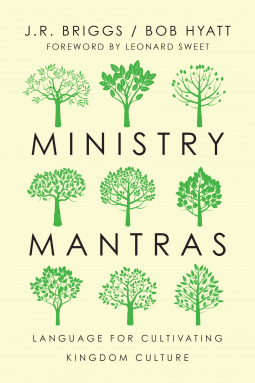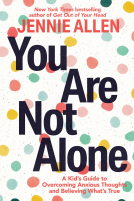
Ministry Mantras
Language for Cultivating Kingdom Culture
by J.R. Briggs; Bob Hyatt
This title was previously available on NetGalley and is now archived.
Send NetGalley books directly to your Kindle or Kindle app
1
To read on a Kindle or Kindle app, please add kindle@netgalley.com as an approved email address to receive files in your Amazon account. Click here for step-by-step instructions.
2
Also find your Kindle email address within your Amazon account, and enter it here.
Pub Date Dec 04 2016 | Archive Date Feb 14 2017
InterVarsity Press | IVP Books
Description
Pastors J.R. Briggs and Bob Hyatt share seventy-five short and memorable mantras they use to cast vision, inspire ministry, and create a healthy church culture. These brief chapters provide a wealth of practical wisdom for leadership, discipleship, community, and witness, embodying best practices with vivid stories of on-the-ground ministry.
Advance Praise
"Leaders are cultural architects. If you want to create a missional
culture, read this book. J.R. and Bob understand that central to any
culture is language. Words shape and form us. Words bring life and
death. J.R. and Bob have freshly inspired me to consider the ministry
mantras that I need to speak and embody to cultivate the church as
movement. For words create worlds and those worlds recreate us."
—JR Woodward, national director, V3 Church Planting Movement, author of Creating a Missional Culture, coauthor of The Church as Movement
"Ministry Mantras is a welcomed water stop in the marathon
that is ministry. Unpacking their tough, to-the-point, pithy sayings
with real-life and biblical illustrations, Briggs and Hyatt serve a read
that is not only refreshing but refueling when facing the ups and
downs, celebrations, and challenges of being on God's mission. Whether
you take a sip here and there or take it all in during one sitting,
you'll find these powerful words resonating in your heart, mind, and
soul long after the pages have been turned."
—Kris Beckert, church planter and mission strategist, Fresh Expressions US
Available Editions
| EDITION | Paperback |
| ISBN | 9780830841363 |
| PRICE | $17.00 (USD) |
| PAGES | 224 |
Average rating from 5 members
Featured Reviews
 Michael D, Reviewer
Michael D, Reviewer
This book was an excellent read. I would highly recommend it to anyone in the ministry or in a leadership role in the church. This book is full of great ideas for doing the Lord's work in the church and community.
 Conrade Y, Reviewer
Conrade Y, Reviewer
A mantra is a short word, phrase, or a chant. It can be a proverb or a wise saying. Inspired by Guy Kawasaki's words "Don't write a mission statement, write a mantra," authors Briggs and Hyatt have taken up the challenge to do just that for the Church ministry and Christian ministries in general. Writing a mantra forces one to choose only the most appropriate and significant words to project a thought or a meaning. It brings clarity to the hearers by first bringing clarity to the writers. According to the authors, mantras need four elements.
It is wise and truthful
The message is clear
It is compelling
It is memorable
A ministry mantra is basically describing the organizational mission or vision in a brief statement. It is important because its simplicity promotes clarity; clarity encourages creativity; and creativity inspires ease of communications. Briggs and Hyatt call it "the proverbial seeds of kingdom values planted in local communities of faith." They structure this book in 80 short chapters, with each chapter titled with a mantra. They supply mantras in two parts: for leaders and for the community. For leaders, there are sections pertaining to leadership; vision; motivation; ministry; pastoral care; leadership development; opportunities; success; and Self-Development. For the community, they write on matters to promote community; formation; tips on responding to conflicts; learning to do outreach and stewardship. Many of the mantras have given rise to creative thinking and opportunities to think out of the box. Some of my favourites are:
"Leadership is Purposefully Choosing Whom You will disappoint"
"Structure must always submit to Spirit"
"Don't Try to make Church relevant to the crowds; Make the Gospel Relatable to the Context"
"If they know you love them, you can say anything to them"
"Ministry is Meeting People where they are and Journeying with them to where God wants them to Be "
"Ministry happens in the interruptions"
"The essence of discipleship i snot knowledge, but imitation"
"Quit looking for leaders and start building them"
"It's kingdom, not competition"
"We will let you down: If we're close enough to help, we're close enough to hurt"
"Community is made, not found"
"Rotate your crops"
"Church is free, but it ain't cheap"
Mantras are languages spoken or written in a clear and brief manner. It cuts away the spaghetti of mass information to yield an important point. While we can always say that context is important, being able to communicate something is better than people disengaging completely. In an attention-deficit world, many are jumping on the bandwagon of short quips and easy quotes. They prefer abbreviations and straight to the point messages. They have no time to bother with long essays. Reading has also taken a beating, with more people choosing electronic media over print. This is why I believe books like this will reach a segment of readers in a way that traditional books could not. It is a great resource for leaders to learn how to do ministry without letting unrealistic expectations overwhelm them. The mantras does three things.
First, it challenges our set thinking. Just because things have been done a certain way in the past does not mean it must be so for the present and future. Indeed, churches that are struggling tend to look back at the good-old-days, forgetting that the past can never be repeated in new contexts. By shaking up the status quo, leaders are forced to be creative and innovative in their ministry approaches. This does not mean throwing the past away. It means being open to change. This openness enables us to humbly seek God for what is best for the Church or ministry. Second. it helps us think out of the box. The ideas like "disagreeing without disengaging" forces us to learn how to disagree without running away from the disagreement altogether. For every conflict, there is a chance to learn more about the other parties and ourselves. Learning to work together is a core need in the Church. If churches fail to work together, what kind of a testimony will that present to outsiders? Third, the book may comprise of brief chapters but what it lacks in depth it more than compensates in the breadth of coverage of issues in ministry.
JR Briggs is founder of Kairos Partnership and calls himself the Pastor/Cultural Cultivator of Renew Community. He has previously written a book entitled "Fail." Bob Hyatt is author, coach, and spiritual director. He is pastor and elder at the Everygreen Community as well as a staff member with Ecclesia Network.
Rating: 5 stars of 5.
conrade
This book has been provided courtesy of Inter-Varsity Press and NetGalley without requiring a positive review. All opinions offered above are mine unless otherwise stated or implied.
Readers who liked this book also liked:
Harold Earls, IV; Rachel Earls
Biographies & Memoirs, Parenting, Families, Relationships








